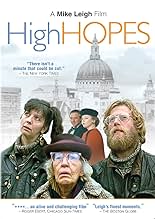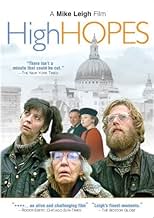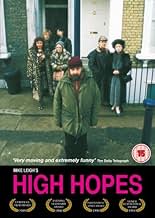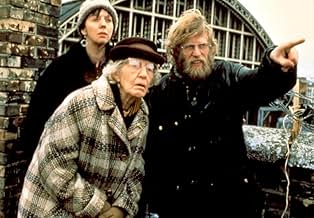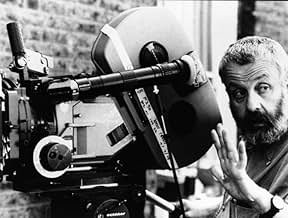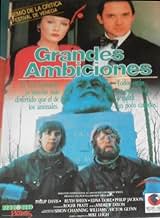CALIFICACIÓN DE IMDb
7.4/10
6.1 k
TU CALIFICACIÓN
Agrega una trama en tu idiomaThe life of a working class couple living in London and their complicated relationships with other members of the family.The life of a working class couple living in London and their complicated relationships with other members of the family.The life of a working class couple living in London and their complicated relationships with other members of the family.
- Dirección
- Guionista
- Elenco
- Premios
- 6 premios ganados y 6 nominaciones en total
Phil Davis
- Cyril
- (as Philip Davis)
Aidan Harrington
- Man in Street
- (sin créditos)
- Dirección
- Guionista
- Todo el elenco y el equipo
- Producción, taquilla y más en IMDbPro
Opiniones destacadas
Surprisingly, this is the first Mike Leigh film I have seen. and I am glad to finally be exploring his filmography since he has intrigued me for quite some time, and I am happy to say with full enthusiasm that my first Leigh movie watching experience was wonderful.
"High Hopes" is a slice of life type film in which there is little plot, but rather a series of events that serve almost as a two hour long snapshot taken at a very specific time in the main characters' lives. While there are many interconnected characters displayed, each with their own mini story arc that can range from light comedy to dark tragedy to somewhere in between, at the center of the film is a likable young couple. A political undercurrent runs throughout the final half hour of the film dealing with the state of England under Margaret Thatcher and the beliefs of a socialist and Marxist, which is all quite interesting even if it makes the film somewhat outdated (but, with me, that isn't much of a problem); however, the film, in the end, is no so much about politics and ideology, but more so about the human spirit and its many triumphs and failures, life and it's many ups and downs. I fell in love with some of the characters in this film, and always felt deep care and concern for them. One shot in particular will always remain in my memory; it is the haunting image of an elderly women on her seventieth birthday as her family explodes (not literally) into chaos behind her. We can only see the elderly women, and we can only hear her screaming, bickering family members under the melancholic sounds of the film's often bleak score. This fragile lady is left to do no less than stare into nothingness, a fragile victim of the world's evils. But...this film is not a hopeless tragedy; rather, it is a hopeful comedy in the end, for, in the end, positivity seems to conquer the tears and tragedies that plagued the film in earlier moments (although not EVERY character seems to receive a "happy ending").
This film is a(n often darkly) humorous look into the lives of some very realistic and unique individuals as they struggle and smile through life. It is a film about love, compassion, strength, weakness, loneliness, politics, society, intimacies, and more. A beautiful feat of comic and dramatic filmmaking that sadly remains overlooked and obscure to this very day; fortunately, Mike Leigh was still rewarded in later years with a reasonably successful and highly praised career made up of many movies critics claim to be masterpieces, many movies that I now cannot wait to get my hands on!
"High Hopes" is a slice of life type film in which there is little plot, but rather a series of events that serve almost as a two hour long snapshot taken at a very specific time in the main characters' lives. While there are many interconnected characters displayed, each with their own mini story arc that can range from light comedy to dark tragedy to somewhere in between, at the center of the film is a likable young couple. A political undercurrent runs throughout the final half hour of the film dealing with the state of England under Margaret Thatcher and the beliefs of a socialist and Marxist, which is all quite interesting even if it makes the film somewhat outdated (but, with me, that isn't much of a problem); however, the film, in the end, is no so much about politics and ideology, but more so about the human spirit and its many triumphs and failures, life and it's many ups and downs. I fell in love with some of the characters in this film, and always felt deep care and concern for them. One shot in particular will always remain in my memory; it is the haunting image of an elderly women on her seventieth birthday as her family explodes (not literally) into chaos behind her. We can only see the elderly women, and we can only hear her screaming, bickering family members under the melancholic sounds of the film's often bleak score. This fragile lady is left to do no less than stare into nothingness, a fragile victim of the world's evils. But...this film is not a hopeless tragedy; rather, it is a hopeful comedy in the end, for, in the end, positivity seems to conquer the tears and tragedies that plagued the film in earlier moments (although not EVERY character seems to receive a "happy ending").
This film is a(n often darkly) humorous look into the lives of some very realistic and unique individuals as they struggle and smile through life. It is a film about love, compassion, strength, weakness, loneliness, politics, society, intimacies, and more. A beautiful feat of comic and dramatic filmmaking that sadly remains overlooked and obscure to this very day; fortunately, Mike Leigh was still rewarded in later years with a reasonably successful and highly praised career made up of many movies critics claim to be masterpieces, many movies that I now cannot wait to get my hands on!
Released in 1988, this is Mike Leigh's (director of Vera Drake) sublime comedy which examines the social climate of 1980s London.
I really liked this film, it centres on one extended family living in London during the Thatcher years. Cyril is a Marxist, who does despite his strong values and views chooses not to act on them, giving the world up for a hopeless cause. His partner, Shirley, desperately wants a baby, despite Cyril's strong views that the world is already "over-populated". Living in the last council house on a now yuppie infested road is Cyril's mum. A member of the generation who has been forgotten, she is slowly losing her marbles, much to the distaste of her neighbours. And as for Cyril's sister, Valerie, who lives in the social climbing climate of the middle class, she has seemingly to forgotten her roots and family ties, no doubt due to her excessive drinking of cheap champagne and her leeching husband.
This film is a brilliant gem of 1980s British cinema, despite its clear socialist values (it's cartoonish portrayal of the rich and yuppie somewhat softens the blow of its left wing message), it brings up so many interesting questions in an intelligent manner, portraying all its characters from a variety of angles and political stances, its hard not to like Cyril, but when he criticises a young 'active' Marxist follower for planning to open a market stall, he is shown to be hypocritical.
Leigh' doesn't just direct, but also write, and the script is water tight. It is extremely witty, just full of emotion and very down to earth.
This film is a very good snap shot of life in a variety of social situations and views in the churning world of the 1980s as the capitalistic London really began to boom. It is a flick that will not doubt have you smiling from cheek to cheek, yet also leave you feeling emotionally vulnerable and self-questioning.
I really liked this film, it centres on one extended family living in London during the Thatcher years. Cyril is a Marxist, who does despite his strong values and views chooses not to act on them, giving the world up for a hopeless cause. His partner, Shirley, desperately wants a baby, despite Cyril's strong views that the world is already "over-populated". Living in the last council house on a now yuppie infested road is Cyril's mum. A member of the generation who has been forgotten, she is slowly losing her marbles, much to the distaste of her neighbours. And as for Cyril's sister, Valerie, who lives in the social climbing climate of the middle class, she has seemingly to forgotten her roots and family ties, no doubt due to her excessive drinking of cheap champagne and her leeching husband.
This film is a brilliant gem of 1980s British cinema, despite its clear socialist values (it's cartoonish portrayal of the rich and yuppie somewhat softens the blow of its left wing message), it brings up so many interesting questions in an intelligent manner, portraying all its characters from a variety of angles and political stances, its hard not to like Cyril, but when he criticises a young 'active' Marxist follower for planning to open a market stall, he is shown to be hypocritical.
Leigh' doesn't just direct, but also write, and the script is water tight. It is extremely witty, just full of emotion and very down to earth.
This film is a very good snap shot of life in a variety of social situations and views in the churning world of the 1980s as the capitalistic London really began to boom. It is a flick that will not doubt have you smiling from cheek to cheek, yet also leave you feeling emotionally vulnerable and self-questioning.
Mike Leigh's bittersweet social satire dissected with devastating accuracy (and a sometimes heartbreaking sense of humor) the widening gap between the haves and have-nots in Margaret Thatcher's England, moving from transparent criticism to crass parody to, finally, a touching plea on behalf of the elderly. It's a gray little film, giddy and depressing all at once, although often as funny (and just as striking) as hearing fingernails scraped down a blackboard. Leigh's cross-section of British society rings true even at its most exaggerated, and his ear for language, whether mumbled Cockney slang or nasal upper-class snobbery, is pitch perfect.
The film is essentially a showcase for some wonderfully defined characters: marginalized counterculture Marxists Cyril and Shirley; Cyril's ultra-neurotic middle-class sister and her vulgar salesman husband; an infirm old mum; a pair of callous upscale neighbors; and an odd, occasional houseguest named Wayne. The plotting is furtive: nothing much happens over the course of the film, giving the cast plenty of room to stretch out in their roles. The characters and story lines were created by the entire cast through extensive pre-production rehearsals, but the finished film is remarkably cohesive, with acting so natural it could easily be mistaken for improvisation if it weren't so well written. The result is a film of rare and genuine emotion: it's either the gloomiest comedy ever made or a tragedy with no shortage of laughs.
The film is essentially a showcase for some wonderfully defined characters: marginalized counterculture Marxists Cyril and Shirley; Cyril's ultra-neurotic middle-class sister and her vulgar salesman husband; an infirm old mum; a pair of callous upscale neighbors; and an odd, occasional houseguest named Wayne. The plotting is furtive: nothing much happens over the course of the film, giving the cast plenty of room to stretch out in their roles. The characters and story lines were created by the entire cast through extensive pre-production rehearsals, but the finished film is remarkably cohesive, with acting so natural it could easily be mistaken for improvisation if it weren't so well written. The result is a film of rare and genuine emotion: it's either the gloomiest comedy ever made or a tragedy with no shortage of laughs.
The title of Mike Leigh's first film was "Bleak Moments" and he's been having them, on and off, ever since. Leigh's films are the comedic equivalent of the Theatre of Cruelty. The pain running through a Mike Leigh movie far outweighs anything 'funny'. You wonder why they are called comedies at all. And the pain is usually the pain of belonging to a family unit. In "High Hopes" the family unit is Edna Dore's almost catatonic London pensioner, her appalling daughter Valerie and her equally appalling husband Martin and her son Cyril and his partner Shirley. Dore's next-door neighbours are a couple of Sloane Rangers with a double-barreled name and if Leigh has a fault it's that he can't help lampooning Valerie and Martin and the snooty neighbours. (Valerie is a clone of the awful Beverly in "Abigail's Party"). These are cartoon characters and they don't ring true.
However Dore, who does virtually nothing, is quietly magnificent as the mother whose life has evaporated in front of her eyes and Philip Davis and Ruth Sheen are heartbreakingly real as the socialist son and the woman he loves but not enough to give her the child she craves. Indeed, Davis and Sheen give the kind of performances that seem to transcend mere 'acting' and which in a just world would be showered with prizes. (Sheen and Dore did win European Film Awards). In fact, everyone is first-rate even the caricatured neighbours and the lamentable Valerie. An uneven work, then, but when Davis and Sheen are on screen it's as good as Leigh gets.
However Dore, who does virtually nothing, is quietly magnificent as the mother whose life has evaporated in front of her eyes and Philip Davis and Ruth Sheen are heartbreakingly real as the socialist son and the woman he loves but not enough to give her the child she craves. Indeed, Davis and Sheen give the kind of performances that seem to transcend mere 'acting' and which in a just world would be showered with prizes. (Sheen and Dore did win European Film Awards). In fact, everyone is first-rate even the caricatured neighbours and the lamentable Valerie. An uneven work, then, but when Davis and Sheen are on screen it's as good as Leigh gets.
This is early Mike Leigh before he achieved that perfect balance in tone between critical and affectionate that distinctly marks his best films. Consequently, while there are wonderfully observed sad and funny bits (like the visit to Karl Marx's grave and the way the Marxist couple treats the lost waif in search of his mom) the main set pieces soon descend into undue caricature (the Yuppie couple in the gentrified housing block) or nastiness (the mom's 70th b-day party). Give it a B minus if only for Ruth Sheen's warm hearted performance that would foreshadow Alison Steadman in the later, better "Life Is Sweet".
¿Sabías que…?
- TriviaBefore High Hopes (1988), director Mike Leigh had made Bleak Moments (1971), released in 1971, and Meantime (1983), released in 1983. This gap in his filmography was attributable in part to his process for creating films: When he applied for financial backing, he did not yet have finished scripts, preferring to allow actors, once they were hired, to use improvisation sessions to create the dialogue. As a result, given the absence of a concrete script, many potential financial backers were reluctant to support Leigh's work. For "High Hopes," that spelled doom until the British TV station Channel 4 stepped in and partially funded it. The result is one of the most moving and engaging films of the 1980s and an early masterwork in Leigh's catalog.
- ErroresAfter they come back from the opera, Lætitia sings the aria "La ci darem" to Rupert, which she claims was from the opera they just saw. They proceed to talk about the characters Susanna and Cherubino. However, these characters are from The Marriage of Figaro whereas the aria "La ci darem" is from Don Giovanni.
- Citas
Rupert Boothe-Braine: Now... what made this country great was a place for everyone, and everyone in his place. And this is my place.
Selecciones populares
Inicia sesión para calificar y agrega a la lista de videos para obtener recomendaciones personalizadas
- How long is High Hopes?Con tecnología de Alexa
Detalles
- Fecha de lanzamiento
- País de origen
- Idioma
- También se conoce como
- Velike nade
- Locaciones de filmación
- Stanley Passage, King's Cross, Londres, Inglaterra, Reino Unido(apartment of Ruth Sheen and Philip Davis)
- Productoras
- Ver más créditos de la compañía en IMDbPro
Taquilla
- Presupuesto
- GBP 1,800,000 (estimado)
- Total en EE. UU. y Canadá
- USD 1,192,322
- Fin de semana de estreno en EE. UU. y Canadá
- USD 27,964
- 26 feb 1989
- Total a nivel mundial
- USD 1,192,322
Contribuir a esta página
Sugiere una edición o agrega el contenido que falta

Principales brechas de datos
By what name was High Hopes (1988) officially released in India in English?
Responda
